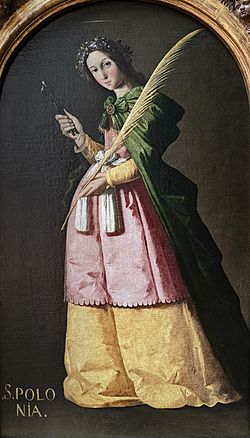Saint Apollonia (Zurbarán) facts for kids
Quick facts for kids Saint Apollonia |
|
|---|---|
 |
|
| Artist | Francisco de Zurbarán |
| Year | 1636 |
| Medium | Oil on canvas |
| Dimensions | 113 cm × 66 cm (44 in × 26 in) |
| Location | Louvre, Paris |
Saint Apollonia is a famous painting from 1636. It was created by the Spanish artist Francisco de Zurbarán. This artwork is an oil painting on canvas. You can see it today at the Louvre museum in Paris, France.
Contents
About the Painting
How the Painting Came to the Louvre
The Louvre museum bought Saint Apollonia in 1867. It came from the art collection of Marshal Soult. He was a famous duke.
This painting might have been part of a large altar in a church in Seville, Spain. It could have been displayed with other paintings by Zurbarán. These include a Saint Joseph Crowned by Christ and a God the Father. These other paintings are now in a museum in Seville. Another painting, Saint Lucy, might also have been a companion piece.
Zurbarán's Style
This painting was made in 1636. This was a time when Zurbarán was creating some of his best works.
Many Renaissance artists painted saints in old-fashioned, flowing robes. But in the 1600s, some painters like Zurbarán, Georges de La Tour, and Caravaggio did things differently. They dressed their saints in clothes that people wore in their own time. This made the saints seem more real and closer to everyday people. It was like they were friends or family, helping to connect people with God.
Who Was Saint Apollonia?
Saint Apollonia is a special saint. She is known as the patroness of dentists. This means she is like a protector or guide for dentists.
The story of her life says that during her martyrdom, all of her teeth were pulled out. This is why in the painting, she is shown holding something that looks like a tooth or a tool for teeth. This object helps us know who she is.
See also
 In Spanish: Santa Apolonia (Zurbarán) para niños
In Spanish: Santa Apolonia (Zurbarán) para niños

